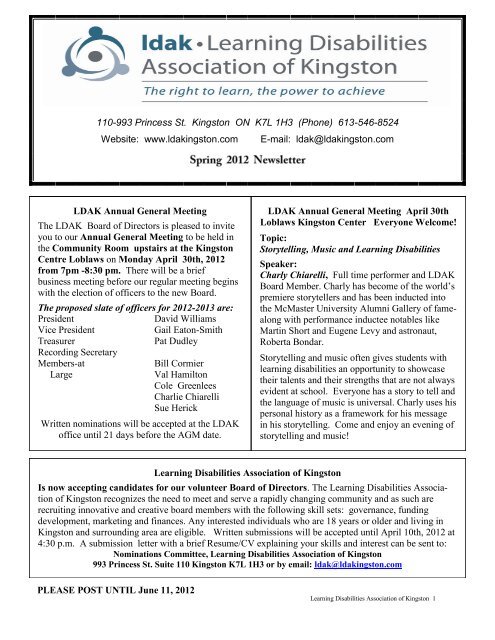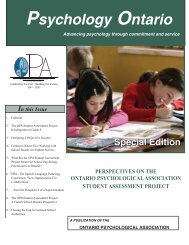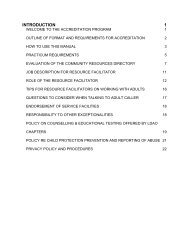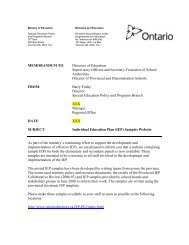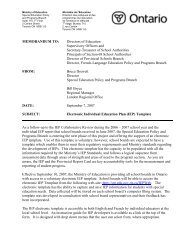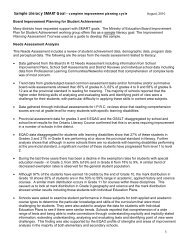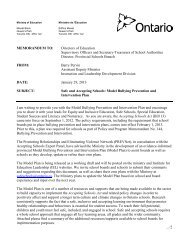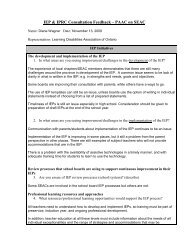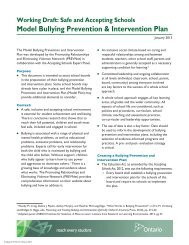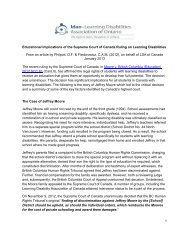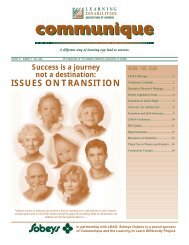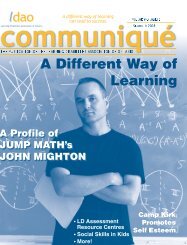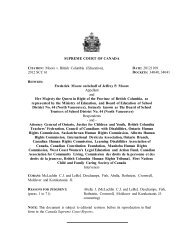Spring 2012 - Learning Disabilities Association of Ontario
Spring 2012 - Learning Disabilities Association of Ontario
Spring 2012 - Learning Disabilities Association of Ontario
Create successful ePaper yourself
Turn your PDF publications into a flip-book with our unique Google optimized e-Paper software.
110-993 Princess St. Kingston ON K7L 1H3 (Phone) 613-546-8524Website: www.ldakingston.comE-mail: ldak@ldakingston.comLDAK Annual General MeetingThe LDAK Board <strong>of</strong> Directors is pleased to inviteyou to our Annual General Meeting to be held inthe Community Room upstairs at the KingstonCentre Loblaws on Monday April 30th, <strong>2012</strong>from 7pm -8:30 pm. There will be a briefbusiness meeting before our regular meeting beginswith the election <strong>of</strong> <strong>of</strong>ficers to the new Board.The proposed slate <strong>of</strong> <strong>of</strong>ficers for <strong>2012</strong>-2013 are:PresidentDavid WilliamsVice PresidentGail Eaton-SmithTreasurerPat DudleyRecording SecretaryMembers-atBill CormierLargeVal HamiltonCole GreenleesCharlie ChiarelliSue HerickWritten nominations will be accepted at the LDAK<strong>of</strong>fice until 21 days before the AGM date.LDAK Annual General Meeting April 30thLoblaws Kingston Center Everyone Welcome!Topic:Storytelling, Music and <strong>Learning</strong> <strong>Disabilities</strong>Speaker:Charly Chiarelli, Full time performer and LDAKBoard Member. Charly has become <strong>of</strong> the world’spremiere storytellers and has been inducted intothe McMaster University Alumni Gallery <strong>of</strong> famealongwith performance inductee notables likeMartin Short and Eugene Levy and astronaut,Roberta Bondar.Storytelling and music <strong>of</strong>ten gives students withlearning disabilities an opportunity to showcasetheir talents and their strengths that are not alwaysevident at school. Everyone has a story to tell andthe language <strong>of</strong> music is universal. Charly uses hispersonal history as a framework for his messagein his storytelling. Come and enjoy an evening <strong>of</strong>storytelling and music!<strong>Learning</strong> <strong>Disabilities</strong> <strong>Association</strong> <strong>of</strong> KingstonIs now accepting candidates for our volunteer Board <strong>of</strong> Directors. The <strong>Learning</strong> <strong>Disabilities</strong> <strong>Association</strong><strong>of</strong> Kingston recognizes the need to meet and serve a rapidly changing community and as such arerecruiting innovative and creative board members with the following skill sets: governance, fundingdevelopment, marketing and finances. Any interested individuals who are 18 years or older and living inKingston and surrounding area are eligible. Written submissions will be accepted until April 10th, <strong>2012</strong> at4:30 p.m. A submission letter with a brief Resume/CV explaining your skills and interest can be sent to:Nominations Committee, <strong>Learning</strong> <strong>Disabilities</strong> <strong>Association</strong> <strong>of</strong> Kingston993 Princess St. Suite 110 Kingston K7L 1H3 or by email: ldak@ldakingston.comPLEASE POST UNTIL June 11, <strong>2012</strong><strong>Learning</strong> <strong>Disabilities</strong> <strong>Association</strong> <strong>of</strong> Kingston 1
LDA Kingston Workshop Series <strong>Learning</strong>=PowerEMPOWERING FAMILIES IN SUPPORT OF CHILDREN WITH LEARNINGDISABILITIESLocation: Loblaws Kingston Centre Upstairs Community Room7pm-9pmMembers: $15.00 Non Members: $25.00Pre-registration is recommended. Email: ldak@ldakingston.com or 613-546-8524 www.ldakingston.comThe <strong>Learning</strong> = Power series has registration bursaries which will be considered upon request.Date: Wednesday April 4 th “Free Video Presentation” “I Learn Differently, Please Teach Me Differently” This DVDproduced by LDA Sudbury is the introductory presentation for a series <strong>of</strong> <strong>Learning</strong> = Power workshops. This engaging andexperiential workshop is meant “to be a voice for persons with learning disabilities”. This DVD is suitable for a general audience,including parents, teachers, employers and students (high school and above). Refreshments and discussion to follow. Atthis workshop we will introduce our follow up series <strong>of</strong> 6 workshops to be held on select Tuesday and Wednesday evenings inApril and May.Date: Wednesday April 11thTopic: “How to Teach Students with LD & AD/HD to Self-Advocate”Speaker: TBADate: Tuesday April 17thTopic: “What’s the Point?” Adapting teaching strategies (teachers and parents who are helping with homework) for studentswith LD/ADHD based on understanding the underlying skills needed, the point <strong>of</strong> the activity, essential elements etc.Speaker: Gail Eaton-Smith, Student Advisor & <strong>Learning</strong> Strategist at Queens UniversityDate: Wednesday April 25thTopic: “IEP 101” Individual Education Plan– A workshop created to help parents and students to understand their role in theIEP process which includes background on the IEP resource project for parents and students; glossary <strong>of</strong> terms and resourcedocuments and links.Speaker: Dr. Allison Sears, Elementary School Teacher, LDSBDate: Tuesday May 1stTopic: “Organizing and Using Your Time” Keeping track, keeping up, fitting it all in...these are common challenges for all <strong>of</strong>us. This workshop will <strong>of</strong>fer practical strategies to help students to organize their time.Speaker: Linda Williams, MA Psychol, Program Coordinator, <strong>Learning</strong> Strategies Development, Queens UniversityDate: Tuesday May 8thTopic: “Behaviour Strategies at Home & at School for Parents <strong>of</strong> Elementary School Students”Speaker: Dr. Sheelagh Jamieson, C. PsychologistDate: Wednesday May 16thTopic: “Transition Strategies from Secondary to College and University for Parents <strong>of</strong> Secondary School Students”Speaker: Dr. Sheelagh Jamieson, C. PsychologistThe workshops can be subscribed to individually, or as a set <strong>of</strong> 6. It is expected that the greatest learning gains willbe obtained by those participants who attend all workshops in the series.These workshops will give parents the opportunity to network, discuss problems, problem solve and <strong>of</strong>fer informationalsupport. Refreshments and discussion to follow each presentation.<strong>Learning</strong> <strong>Disabilities</strong> <strong>Association</strong> <strong>of</strong> Kingston 2
Reaching Out to Older People with DyslexiaIdentifying dyslexia in seniors can be fraught with difficulties – and literature on the subject is indeedscant – but a recent project in England laid the foundation for a new framework understanding dyslexiain our elderlyThese days, dyslexia is a well-recognized condition, but things were very different a few generationsago. Hundreds <strong>of</strong> thousands <strong>of</strong> people who are now in their 50s and above weresimply labelled as “stupid” at school – and left to suffer a lifetime <strong>of</strong> shame and fear, unable toread road signs, write letters or even pay bills. Until now, there has been very little researchundertaken into the specific issues around older people and dyslexia, but recognizing it in thisolder age group is extremely important, as not only can it affect their literacy and numeracyskills but it may also affect their quality <strong>of</strong> life, independent living and decision-making.Dyslexia is a specific learning difficulty, or learning difference, that affects many aspects <strong>of</strong> lifeand learning. There is no one, definitive definition <strong>of</strong> dyslexia and the different definitions givegreater or lesser weight to various aspects <strong>of</strong> the syndrome. The word ’dyslexia’ comes from theGreek, and means ’difficulty with words’. Many definitions focus on the negative aspects – thedeficits and difficulties that are experienced. However, other definitions focus to a greater degreeon the associated talents and skills that people with dyslexia <strong>of</strong>ten exhibit.Exclusion due to dyslexia can be particularly acute for older people – which affects one in five.They may have difficulties accessing services and benefits which are vital to their quality <strong>of</strong>life. Combined with mobility or financial constraints, this may lead to isolation or exclusion. Forexample, problems with <strong>of</strong>ficial literature, form-filling, direct payments for care, direct paymentsfor pension, pin codes, paying bills, banking, text messaging, emailing and using the Internet.The National Institute <strong>of</strong> Adult Continuing Education (NIACE) and the <strong>Learning</strong> and Skills DevelopmentAgency are leading a project to develop what they call a “Framework for UnderstandingDyslexia” supported by other organizations working to help older dyslexics. One 65-year old ladysaid: “I could not read when I left school, and when later in life I found out that I was dyslexic itwas a relief – like a weight had been lifted <strong>of</strong>f my shoulders. Finding out about the dyslexia Ibecame determined to improve my literacy and joined several classes at school and college. Ihave now overcome my difficulties because <strong>of</strong> the tutors’ encouragement and reassurance.“I wanted to be able to write properly before I went to my grave. I have been able to write my ownChristmas cards for the first time, it was a lovely feeling, it really felt good. I have been ableto help my grandsons, and now I am going into a local primary school to help children to read and<strong>Learning</strong> <strong>Disabilities</strong> <strong>Association</strong> <strong>of</strong> Kingston 3
Reaching Out to Older People with Dyslexiagain confidence. It means an awful lot. It means that I can learn more for myself. I can writemore and have the confidence to pick up a pen. I want to do more. <strong>Learning</strong> becomes infectious.”The causes <strong>of</strong> dyslexia are not fully understood, but there is strong evidence to suggest small butsignificant biological differences between the brains <strong>of</strong> dyslexic and non-dyslexic people in theprocessing <strong>of</strong> visual, motor and auditory information, particularly in relation to language. Dyslexiaalso tends to run in families, and adults may only become aware <strong>of</strong> their own dyslexia for the firsttime when younger family members are identified as having dyslexia.Dr. Rebecca Thompson, a psychology research fellow at the Research Institute for the Care <strong>of</strong>the Elderly at St. Martin’s Hospital, Bath, said: “In addition to thinking about the effects <strong>of</strong> agingon dyslexia, work in this area also needs to take into account the fact that many older adults maynever have had their dyslexia identified because at the time when they were being educated, itwas a little known and little diagnosed condition. They have therefore had to develop copingstrategies to deal with their lives, and <strong>of</strong>ten feel that they have missed out because <strong>of</strong> their lack <strong>of</strong>literacy.”One 60-year old gentleman said: “I was unable to read and write and, at the age <strong>of</strong> 60, I decidedI couldn’t carry on like that. I couldn’t go shopping properly or go to the library, for example. I wasunable to function normally. If I couldn’t find someone to help me with letters or bills, I just threwthem in the bin. I never really did overcome my difficulties before I came to the adult college,where I’ve really enjoyed meeting new people. My learning has made me much more confident.“For the first time in my life I can express myself in writing. When I came to college I said I wantedto write a book about myself. I have now done this, and although the book itself is only small, ithas been a major achievement for me. I can also now do things like buy a T.V. guide and seewhat will be on TV. Little things like this make all the difference in the world to me.”The assessment <strong>of</strong> dyslexia in adults, and especially in older adults, can be complex becausemany adults have developed coping strategies which may effectively compensate for any difficultiesthey experience. In addition, older adults may have reduced visual and auditory acuity, aswell as medical conditions that may affect their processing <strong>of</strong> information and their memory. All <strong>of</strong>these need to be accounted for during the assessment process.Shirley Cramer, Chief Executive <strong>of</strong> Dyslexia Action, National Council Member, The <strong>Learning</strong> and<strong>Learning</strong> <strong>Disabilities</strong> <strong>Association</strong> <strong>of</strong> Kingston 4
Reaching Out to Older People with DyslexiaSkills Council, reported that, “The consequences <strong>of</strong> years <strong>of</strong> failed policies for children with dyslexiaare that there are hundreds <strong>of</strong> thousands <strong>of</strong> adults with dyslexia who have never been identified.For these adults, further education through colleges or work- based learning is their secondchance and it is critical that there are appropriate services available to enable them to succeed.Colleges and other providers need to have a robust screening system to identify these adults withhidden disabilities and appropriate teaching strategies and tools to ensure that the person doesnot experience failure again. Understanding the’ baggage’ that goes along with these difficulties isanother important aspect <strong>of</strong> the support.”NIACE and the <strong>Learning</strong> and Skills Development Agency led the project that culminated in thedevelopment <strong>of</strong> the Framework for Understanding Dyslexia. Contact the Team at: 21 De MontfortStreet, Leicester, LE1 7GE. Tel: 0116 2044218, or email:rachel.davies@niace.org.uk. They are also available on the website at www.niace.org.uk.Originally published in Mature Times.co.UKGrateful acknowledgement to republish this article is extended to our friends in England!LDAO CommuniqueIf not, you can watch it online for free:Have you ever watched the FAT City Video??“HOW DIFFICULT CAN THIS BE?”The F.A.T. City <strong>Learning</strong> Disability workshop by Richard Lavoie.F.A.T. City stands for Frustration, Anxiety and Tension which comes from livingwith a learning disability.View the video online at the following website:http://digital.films.com/play/8JBT6ZCADSPPE ResourcesThere are some great resources on the Canadian <strong>Association</strong> <strong>of</strong> Disability Service Providers inPostsecondary Education website.http://www.cacuss.ca/divisionsCommunities/CADSPPE/Resources.htm<strong>Learning</strong> <strong>Disabilities</strong> <strong>Association</strong> <strong>of</strong> Kingston 5
ADHD MEDICATION DISPENSATION ALERTADHD Medication Dispensation Alert for <strong>Ontario</strong>The <strong>Ontario</strong> Ministry <strong>of</strong> Health is changing the way doctors prescribe and pharmacists dispense most drugsused to treat ADHD as <strong>of</strong> November 1, 2011.You need to make sure you have identification when you see your doctor. Your doctor will record youridentification number on the prescription. If this is not done, the pharmacist will not be able to provide youwith your medication. Prescriptions currently on file at your pharmacy are exempted from this requirement.When you pick up your medication from the pharmacy, the person who picks up the prescription will needto provide identification to the pharmacist too.Drugs affected by this change:Adderall XRBiphentinConcerta and so called genericsAny form <strong>of</strong> Dexedrine and genericsAny form <strong>of</strong> Ritalin and genericsVyvanseThis change does NOT apply to Strattera.Identification that will be accepted:<strong>Ontario</strong> Health Card or other health card issued by a Province or Territory in CanadaValid Driver’s License or Temporary Driver’s License (issued by <strong>Ontario</strong> or other jurisdiction)<strong>Ontario</strong> Photo CardBirth Certificate from a Canadian province or territoryGovernment-issued Employee Identification Card<strong>Ontario</strong> Outdoors CardBYID (age <strong>of</strong> majority card)Certificate <strong>of</strong> Indian StatusValid Passport – Canadian or other countryCertificate <strong>of</strong> Canadian CitizenshipCanadian Immigration Identification CardPermanent Resident CardOld Age Security (OAS) Identification CardCanadian Armed Forces Identification CardRoyal Canadian Mounted Police/Provincial/Municipal Police IdentificationFirearms Possession and Acquisition License (PAL)Refer to the <strong>Ontario</strong> Ministry <strong>of</strong> Health website for more information:http://www.health.gov.on.ca/en/public/programs/drugs/ons/Source: LDAO<strong>Learning</strong> <strong>Disabilities</strong> <strong>Association</strong> <strong>of</strong> Kingston 6
This and That....ABCs <strong>of</strong> Mental HealthNew parent resource and updated teacher resource launched February 6, <strong>2012</strong> by Hincks-Dellcrest Centre.The ABC’s <strong>of</strong> Mental Health provides two free, web-based resources—one for teachers and one for parents—tohelp answer questions about children's behaviour and ways to respond. The Resources includeideas for promoting the mental health <strong>of</strong> children and adolescents, information about how childrenchange as they get older, descriptions <strong>of</strong> behaviour that might indicate a problem, and practical suggestionsfor steps to take. The ABCs <strong>of</strong> Mental Health is available at www.hincksdellcrest.org/abcScholarshipshttp://www.disabilityawards.ca/ for an up to date listing <strong>of</strong> all the available Canadianawards, scholarships and government funding for students with disabilities.http://www.disabilityawards.ca/ Awards for Post - Secondary Students with <strong>Disabilities</strong>site developed by the National Educational <strong>Association</strong> <strong>of</strong> Disabled Students(Canadian database <strong>of</strong> thousands <strong>of</strong> scholarships, bursaries, fellowships, grants and otherfinancial awards)Winter Bluegrass Series <strong>2012</strong>In support <strong>of</strong> the <strong>Learning</strong> <strong>Disabilities</strong> <strong>Association</strong> <strong>of</strong> KingstonMarch 20th - Grasstowne April 24th - Nothin’ FancyNew location: The Kingston Christian Fellowship Church located at 2621 Highway 38, Kingston.**PLEASE NOTE ALL CONCERTS WILL BE ON TUESDAY EVENING 7pm **Tickets: $25.00 single ticket or $45.00 if you wish to purchase a single ticket forboth March and April showsDetails contact: Bill and June White 613-372-2400 or Cell 613-540-1485Please note: Limited Tickets First Come, First Servedwww.ldakingston.com<strong>Learning</strong> <strong>Disabilities</strong> <strong>Association</strong> <strong>of</strong> Kingston 7
L. D. A. K. EXECUTIVEPresidentVice PresidentTreasurerSecretaryMembersat LargeDisclaimer2011 - <strong>2012</strong>David WilliamsGail Eaton-SmithPat DudleySue HerrickVal HamiltonBill CormierCharly ChiarelliCole GreenleesRESOURCE CENTRE HOURSTuesday-Wednesday-Thursday11 am—3 pmSaturday & Sunday ClosedResource Centre Co-ordinatorLana GreenwoodTHE LEARNING DISABILITIES ASSOCIATIONdoes not endorse or recommend any <strong>of</strong> thefacilities listed or any <strong>of</strong> the methods,programmes, products or treatments <strong>of</strong>fered bysuch facilities.Our aim is to keep the community informed aboutservices and facilities that are available to peoplewith learning disabilities.We urge consumers and service providers toreview carefully any programmes and serviceslisted in order to select those which will meetmost appropriately the identified needs <strong>of</strong> theperson with learning disabilities.Membership Application FormName:_______________________________Address:__________________________________________________________________CITY PROVINCE POSTAL CODETelephone: (H)___________ (W)__________ANNUAL DUES:(Effective April 2/04)Family/Individual - 1 Year Fee -$50Student (1 Year Fee Only) - $20 Institutional (1Year Only) - $125 Pr<strong>of</strong>essional (Private Practices)1 Year Fee - $75 I would like to volunteer to help with: Fundraising Publicity Other Membership NewsletterMembership Advantages:subscription to Communiquéaffiliation with local, provincial and nationallevels <strong>of</strong> LDAfree information on learning disabilitiesfree access to Kingston's resource centre andthe lending library <strong>of</strong> LDA <strong>Ontario</strong>discount on LDA conferencesYour membership is important in providinga stronger voice within all levels <strong>of</strong> the<strong>Association</strong>.Please tear <strong>of</strong>f and mail this form and cheque(made out to LEARNING DISABILITIESASSOCIATION OF KINGSTON) to<strong>Learning</strong> <strong>Disabilities</strong> <strong>Association</strong> <strong>of</strong> Kingston110-993 Princess St. Kingston On K7L 1H3THANK YOU<strong>Learning</strong> <strong>Disabilities</strong> <strong>Association</strong> <strong>of</strong> Kingston 8


